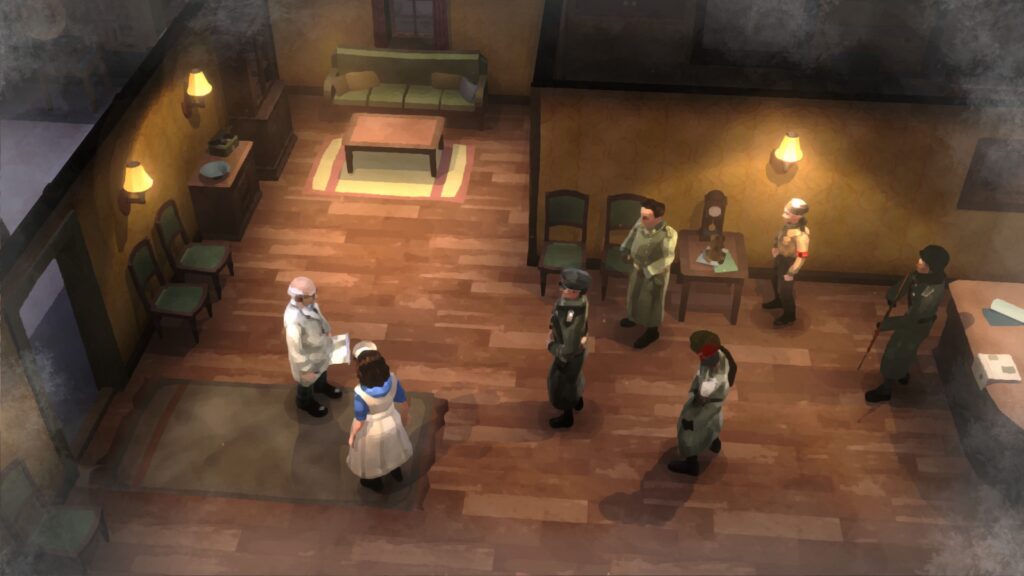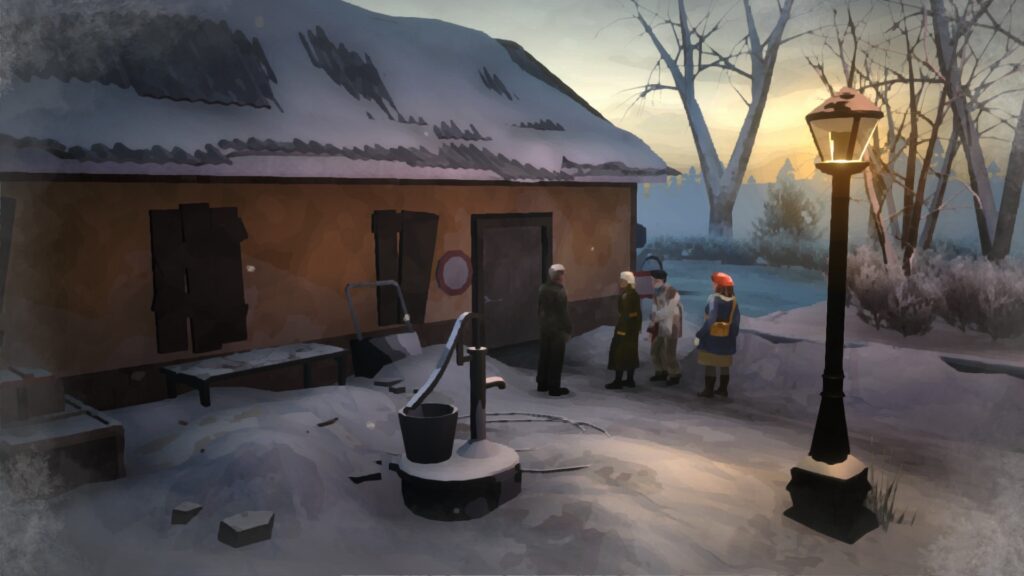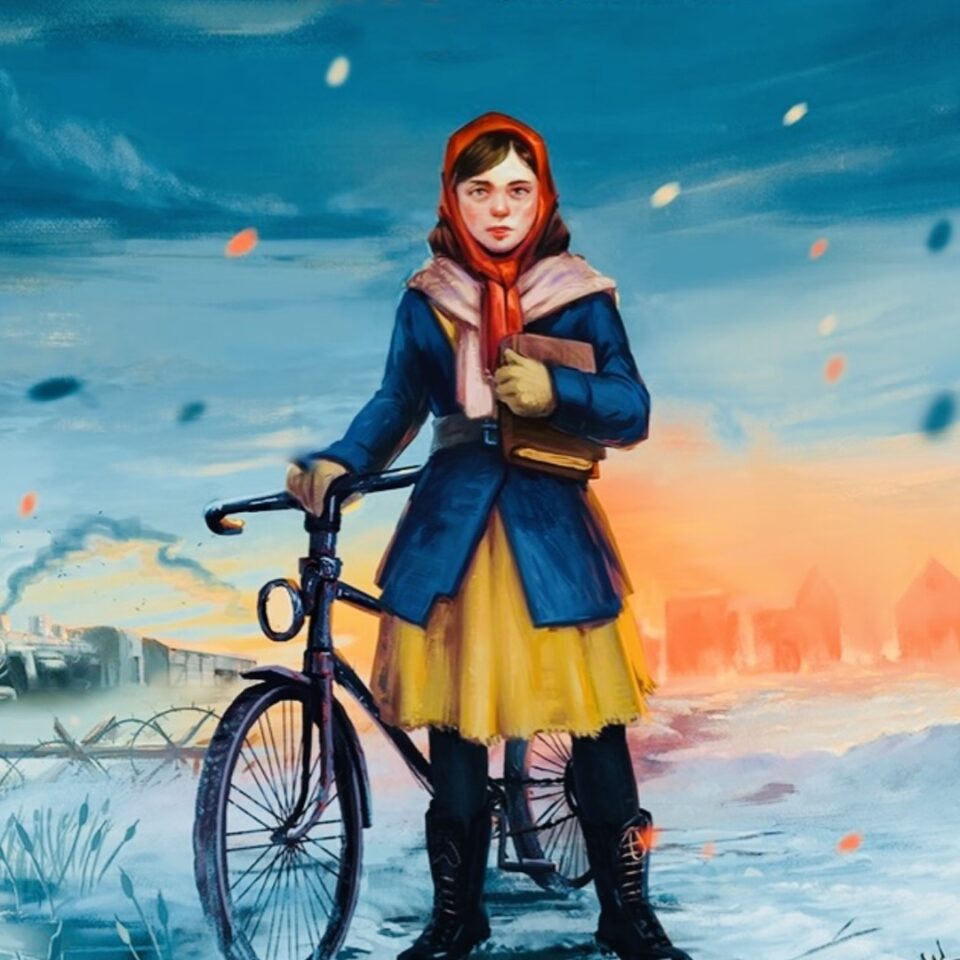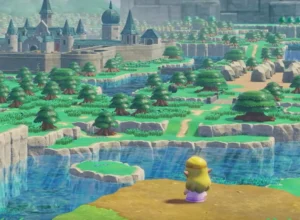Gerda: A Flame in Winter is a narrative-driven RPG, set in occupied Denmark in 1945. Rarely do narratives come more driven than that.
The game’s heroine is Gerda Larsen, a nurse who lives and works in the town of Tinglev. The story begins in February, and the place creaks with snow. Like 11-11 Memories Retold, another wartime tale, the art style (by Caroline Fangel) favours a dappled blur; but where that game appeared to shimmer and tremble, Gerda’s story is still. “Our lives became more muted,” she says, of the occupation, before taking heart in the comforts of daily routine. “The simple pleasures of life remained to us, perhaps painted stronger than ever before.”

We view these pleasures from on high. As Gerda travels between locations, we look down on the streets as though gazing at a map – a clever touch, giving her workaday errands the feel of a carefully waged battle. As the plot unwinds, that is what they become. Gerda lives with her husband, Anders, whose gentle mien belies an anti-German fervour. This is a doubly tricky position to hold, as his wife is half-German, meaning that he has not only to navigate the hardships of Nazi rule but also to stay on Gerda’s good side. As for the hardships, we learn that “scarcity made itself known,” that “indulgences became more and more modest, until a pinch of sugar became a luxury.”
At the risk of making invasion sound like one of those militant diet plans, this is a lovely description, and it’s to the game’s credit that we feel the war not booming against the windows but creeping in through the kitchen. Near the start, a pan of porridge is burnt through inaction, and the image, with its faint tang of the fairy tale, hangs around. You can’t be everywhere at once, in Tinglev, and other pots are starting to bubble. There are sick folks in the clinic where Gerda works, including German soldiers; there are Jewish refugees in hiding, trying to slip away to Sweden; and the Danish resistance plots from a forest redoubt.
Your decisions are governed by Gerda’s “mental energies,” which are filed into three categories: insight, compassion, and wit. At the end of each chapter, as she reflects on the day in her diary, you decide her reaction to events and gain corresponding points. These you then spend, to affect different outcomes. A young Jewish girl is crying in a hideout, for example, with German officers outside, so you spend a compassion point and give her a teddy bear to calm her down. A fraught situation diffused with a pinch of sugar. There are other actions that depend on random chance, just to spice the proceedings with a reminder of cosmic indifference. And your standing with different parties – the occupation, the Danes, the resistance, and so on – rises and falls as a result of your choices.

Where Gerda: A Flame in Winter succeeds is in this courteous juggling act. It’s a game of manners, in which pinning a swastika to your lapel, to oil your interaction with the Gestapo, seems as explosive a gesture as picking up a gun. Like This War of Mine, the focus is not on soldiers but on those in their shadow at home, who register the shocks of conflict in other ways. Unlike that forbidding game, whose besieged tenements were filtered through the hues of a black eye, here the tensions play out across the kind of landscape that would adorn a Christmas card. Far from softening the stresses of its time, however, this adds an ironic tension. The way the colours of the visuals smear and run looks like darkened slush, and look at the loading screen, on which progress is indicated by a candlestick, burning steadily to a nub. Such is Gerda’s struggle: giving out a reassuring glow and being thoroughly worn down by the effort.
It’s not often that Scandinavia features in games about the Second World War. Norway had a great supporting role in Battlefield V, flaunting its frosty curves and polar lights. But that mini-campaign, whose heroine specialised in hurling knives at German troops while haring past them on skis, belonged more to a Bond movie than to planet Earth. Here, Denmark gets a star turn – in a game that feels rooted in reality. (Check out the “facts” tab in Gerda’s diary, brimming with historical context.) And no wonder: the developer is PortaPlay, a small Danish studio, described, on its website, as a “full-service provider of interactive solutions.” That sounds a lot like Gerda Larsen. Until now, PortPlay has mostly made educational software, and if this marks the studio’s adventure debut, it shouldn’t surprise us that it retains the weight of a lesson.

Nor should it surprise us, given that this marks the publishing debut of Don’t Nod, that we encounter branching dialogue and a raft of moral quandaries. The common thread of Don’t Nod’s games is that their heroes, endowed with supernatural powers, are stitched up by fate; as such, their villains are surplus to requirements. Think of Max, in Life is Strange, faced not just with the prospect of temporal oblivion but with a predatory photography teacher. As for Jonathan Reid, the hero of Vampyr, he spent so much time in pale protest to his newfound nightlife that I can’t actually recall if he had a solid foe. This state of affairs is perfect for Gerda: A Flame in Winter, where affairs of state are the principal menace, and grow all the more in their perversity for being faceless.
Not that we don’t get our share of brutes. There is Reinhardt, a sweaty soldier who rummages in the doctor’s cupboard for pills, and Kriminalinspektör Stahl, who collects knick-knacks and, when the occasion calls for it, people, in the cells of the local police station. But what you are left with, more than anything, is a sense of a woman straining against the crosscurrents of her situation. The only performance we hear is that of Freya Miller, who voices Gerda in a brittle narration; combined with Jakob Støvring Hansen’s plaintive piano score, the atmosphere is a little too striving. Clearly, the developers at PortaPlay want to warm your heart with earnestness, but you want to tell them to take a cue from Tinglev and cool it. Nonetheless, Gerda: A Flame in Winter gives us much to relish. It may not come bearing action, but its star flickers with powers of her own. More than anything else, it reminds us that, when we are seized by circumstances beyond our control, the simple pleasures remain.
Game: Gerda: A Flame in Winter
Platform: Nintendo Switch, PC
Publisher: Don’t Nod
Developer: PortaPlay
Release Date: Out now






